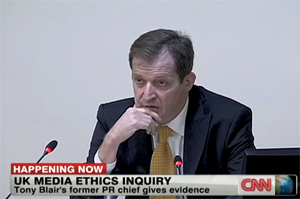Alastair Campbell, who headed communications for U.K. Prime Minister Tony Blair from 1997-2003, said in an article published in the Huffington Post June 28 that the PR industry has done a "lousy job on its own reputation" resulting in terms like "PR" and "spin" being "synonyms for B.S., lies, deception.
 He feels journalists and bloggers are better at communicating.
He feels journalists and bloggers are better at communicating.
Our opinion is that some of the blame for the bad rap on PR falls on the major PR groups -- PR Society of America and International Assn. of Business Communicators -- neither of which has any sort of "PR for PR" program.
The behavior of the two groups (IABC’s new chair Robin McCasland has just called reporters "dogs" and PRSA has not had a press conference since 1993) has added to the burden that PR's reputation has to carry.
The PR Society, whose income of $10 million makes it about twice as big as IABC, has the greater burden.
It has been conducting a war with its trade press in recent years, barring any reporters from its Assembly in 2011-2012. It stopped giving members transcripts of the Assembly after 2004.
IABC at least lets reporters join and have access to information, including contacts with other members. PRSA will not let reporters join.
Journalists Are More Believable -- Campbell
The "real spin doctors in the modern world," according to Campbell, are "journalists, broadcasters and bloggers and they want their readers, viewers and listeners to think they have a monopoly on truth."
He doesn't like it, but he admits that journalists, although under heavy criticism themselves, have more credibility than PR people.
Campbell wrote that journalists "subtly and not so subtly suggest that people ignore everyone else -- politicians and their spokesmen, companies and their advisers, countries and their brand managers. And that is a change from most of the past decades when news and comment, fact and opinion, were more separate than they are today, when people assumed that governments and leaders and brands would want to propagandize on their own behalf, and had every right to do so. It's just that it got a lot harder."
Campbell is admitting that it's very difficult to spin anything these days when so many journalists and amateur journalists are finding out things and sharing them with each other.
What we see is a retreat from the vast tide of information that the internet represents. PR practitioners are helpless in the face of such a deluge of information and many have gone to the bunkers.
People Can Separate Reality from Spin
The internet, according to Campbell, is helping people to be "better at knowing reality from spin, separating good from mediocre; they're faster at making judgments at which is which, and often they are right. So the driving question should not be, 'what will the Daily so and so say if we do this?' but what should we do and what should we say about what we do, to help meet the objectives we have set for ourselves and pursue the strategy we have agreed to meet those objectives and take the public with us as we go?"
He feels the "definition of PR as being focused on getting good press, whatever that means these days, is close to being redundant."
He admits that he has had plenty of "bad publicity" himself and wonders if people want to hear what he has to say: "That to me stems from putting reputation and strategy ahead of giving a damn about what people say about you on a day-to-day basis."
He feels that what really matters for PR people is giving "strategic advice and reputation support."


 AB InBev has hired Donna Lorenson as chief communications officer and elevated the PR function to the senior leadership structure in the aftermath of the Bud Light marketing disaster.
AB InBev has hired Donna Lorenson as chief communications officer and elevated the PR function to the senior leadership structure in the aftermath of the Bud Light marketing disaster. Tunheim handled the Minnesota USA World Expo bid committee, which on June 21 congratulated Serbia for landing the 2027 event.
Tunheim handled the Minnesota USA World Expo bid committee, which on June 21 congratulated Serbia for landing the 2027 event. United Minds, management consultancy, has launched Myriant, a business resiliency offering to help clients deal with the challenges during this era of misinformation, polarization and geopolitical upheaval.
United Minds, management consultancy, has launched Myriant, a business resiliency offering to help clients deal with the challenges during this era of misinformation, polarization and geopolitical upheaval.  ImageShield, which guards against online image abuse, is looking for a communications pro to handle its PR and marketing campaigns.
ImageShield, which guards against online image abuse, is looking for a communications pro to handle its PR and marketing campaigns. Who knew that there is a real paper company, Pennsylvania Paper & Supply, inside the iconic building seen at the opening of every episode of “The Office?”
Who knew that there is a real paper company, Pennsylvania Paper & Supply, inside the iconic building seen at the opening of every episode of “The Office?” 


 Have a comment? Send it to
Have a comment? Send it to 
No comments have been submitted for this story yet.